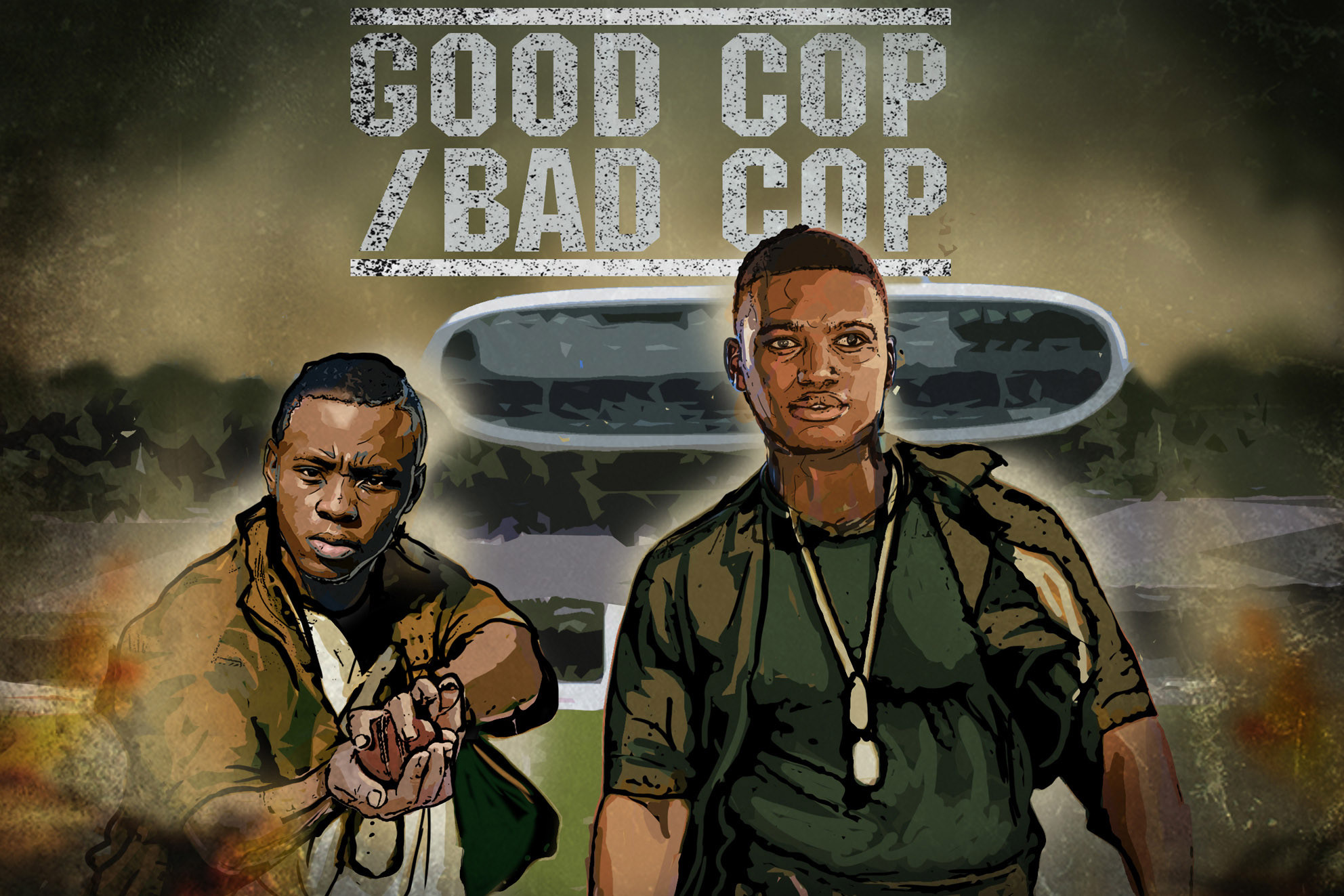Rabada and Ngidi are ready for a summer of dreams
Kagiso Rabada and Lungi Ngidi plan to take their good cop-bad cop act to the World Cup and, unscarred by previous Proteas failures in the competition, return as winners.
Author:
19 April 2019

Cricket is obsessed with partnerships. Sometimes they even define the sport. Be they coach and captain bonds, batting alliances atop the order or in the middle, or even bowling units forged by a convenient chemistry and then tattooed on to the wider consciousness by piles of wickets and wins.
Courtney Walsh and Curtly Ambrose. Kumar Sangakkara and Mahela Jayawardene. Matthew Hayden and Justin Langer. The game’s history is littered with terrific double acts whose stories are so intertwined you cannot name one without thinking of the other.
The South African cricket team has a new double act brewing in the form of Kagiso Rabada and Lungi Ngidi. They have been taking names and ratcheting up cricketing numbers around the world for the past few seasons, with Rabada already firmly entrenched as the best in the world. Ngidi has suffered several injuries, going back to his teen years. He is different to Rabada in a physical sense, vastly so.
In another world, the man mountain from KwaZulu-Natal may have been a hulking assassin at the back of a Springbok rugby scrum. Ngidi stands high and mighty on top of a heaving mass of muscle and mechanics. He rumbles up to the crease, building momentum all the way there. A bruiser, if you will.
Rabada, meanwhile, slips into gear with uncommon ease. His pace is generated almost effortlessly as he lopes in and delivers, regularly at more than 140km/h, with a rapid arm action and powerful shoulder.
Their job titles and descriptions are the same, but Ngidi and Rabada go about their business in very different ways.
Good cop, bad cop
In a sense, the two bowlers evoke iconic film cop buddies. Like Starsky and Hutch, or Mike Lowrey and Marcus Burnett as played by Will Smith and Martin Lawrence in the cult film Bad Boys.
Smith is the smooth talker while Lawrence is the twitchy and combustible senior partner. Their fast-talking, good cop-bad cop routine is humorous, but delivers results. It works, and that is the key to successful partnerships.
Ngidi is the strong, silent type. He hits the bat hard and then the engine smooths down as he follows through, right up to the batsman. At such close quarters, a look from him carries enough menace for articulation to be a moot point.
Good cop.
Rabada also delivers six slices of sincerity in every over. But he is not averse to striking up a conversation, even though his words are not nearly as loud as his actions. Not nearly, but his character casts him as a bad cop. He doesn’t even argue.
Related article:
“I’ll definitely be the bad cop,” says the best Test bowler in the world.
He was talking in Durban, in the midst of a one-day international (ODI) series against Sri Lanka. Having just passed the 100-wicket mark in ODI cricket, Rabada was in a reflective mood as he pointed out the significant strides he still wants to make in the 50-over format.
Along the way, he is enjoying sharing the stage with Ngidi. While Rabada and his exploits have already garnered a cult following around the world, his partner at the other end is still at the point of introduction.
“I feel like we can switch roles. But people know me as the bad cop, and I am fine with that,” Rabada shrugs.
A long rap sheet
How could they not? In the long history of Test cricket, only a handful of cricketers have required a Johnny Cochrane-type intervention, as Rabada and his shoulder did against Australia, in the late summer of 2017-2018.
Like most elevated athletes, Rabada is often at his best when pushing the boundaries. He has a rap sheet to prove it. There was a period during which he was so in-your-face that it forced officials to pay as much attention to what happened between deliveries as to his actual deliveries.
“But I can be a good cop as well,” he says.
To be sure, Rabada displays plenty of genuine character traits. He is unflinchingly loyal and protective of those associated with him. He cares deeply for the collective and is acutely aware of his place in the game and in the constantly evolving South African narrative.
Related article:
Unlike Rabada, Ngidi has always been seen as a good guy, a feeling heightened by the events on one spicy Sunday at Kingsmead in 2018. Quinton de Kock and Australia’s David Warner were hurling insults at each other as they left the field on the fourth day and, as they ventured up the stairs, De Kock said something that pushed Warner over the edge. The bristling Australian vice-captain lunged at him and Faf du Plessis and Rabada emerged from the Proteas dressing room to see what the fuss was all about.
It was unsurprising to see the skipper step out. Duty always calls for the captain. Rabada, though, chose to be there. It was instinctive, protective and assertive.
Statue in the Kingsmead staircase
Ngidi was caught in the crossfire while trying to make his way downstairs. He simply stood quietly, as words and threats spiralled out of control. “I still get called a statue to this day by the coach,” Ngidi winces.
“They said I looked like those guards who stand outside Buckingham Palace. I don’t mind people thinking that I am like that,” he says. “Off the field, I stay away from conflict. I am not a violent person. On the field, though, things change. A lot.”
Related article:
Ngidi reiterates that his line of fire requires less talk as he prefers to leave an impression by his actions. When it is put to him that Rabada has noted there is a menace within the quiet exterior, Ngidi smiles.
“I think history can show who has done what. We can go back,” he jokes about his buddy’s colourful past with the law.
“He can say what he wants, but he knows the truth. His record speaks for itself. If we look back at footage, we will see. I am always the smiling one, so someone else is the aggressor,” he adds with relish.
Ngidi’s fury
The misconception, then, is that he is a bit of a soft touch. The few that met him on the rugby fields of Hilton College will attest to the fact that he is anything but. Ngidi’s fury comes in small, potent doses.
“We both have it [aggression]. But we display it in different ways. Competing on the international stage, I am not there to make friends,” says Ngidi.
“When it’s head-to-head, I believe that I can be the only winner. It may not be aggressive in terms of me speaking, but it is in the lengths I bowl and the pace I bowl with. I try to be fuller, more in a batsman’s face in that sense. I would rather beat them skilfully than verbally.”
Good cop.
And while they might rib each other about their approaches to battle, there is an overwhelming sense of pride that they are doing this together. They stand on the brink of a senior World Cup appearance and this time they will be in it together.
Related article:
Ngidi was injured in 2014, when Rabada, Aiden Markram and Andile Phehlukwayo went to the Under-19 World Cup and returned with the trophy.
It hurt Ngidi, of course, but there is no resentment. He knows that the nature of the beast dictates that injuries will occur. If anything, he is effusive in his praise of what Rabada and company accomplished.
“They know how to win a World Cup,” he says sincerely. ”So, to be taking prospects like that to the World Cup is exciting in itself for South African cricket.”
He had to play catch-up after that, in domestic and then in international cricket. It is a constant challenge to be 100% fit, the gift and curse of such a formidable frame.
In full flow, he is a hugely intimidating figure, the ball seemingly a marble in his hand as he dominates the popping crease. He is an arresting sight, probing on or around off-stump. Both he and Rabada had a fascination with taking wickets even before their paths crossed in age-group cricket.
Friends on and off the field
“Even when we are not playing, we are always chatting about game plans and certain players. He gets me,” says Ngidi. “We get each other.”
Initial mutual respect has matured into friendship.
“And Andile,” Ngidi corrects, adding the jovial all-rounder to the mix. “That’s the coolest part. You grow up with people and you end up succeeding in a craft together. It’s a lot of fun and being able to represent South Africa with friends is even better.
“We are all really good mates. We have gone on holiday together, so it is about a lot more than just work. We spend a lot of time together outside of cricket. Even when we are not playing, we chat about certain batsmen. I’ve been watching him now in the IPL [Indian Premier League] and he is doing well,” says Ngidi.
“That relationship makes it a lot easier on the field. You feel that you have someone who understands you better, and can see when you are not yourself. A lot of things seem to click when we are together.”
World Cup ambitions resting on bowling attack
South African cricket followers will be hoping those things click during the English summer, when the Proteas hope to finally lift their first senior World Cup.
A generation of fans and players have become accustomed to the pain of each World Cup, but the likes of Rabada and Ngidi don’t carry the scars of previous horrors. They have overcome all challenges to this point and there is a mounting feeling that South Africa have an attack that could win a World Cup.
Rabada and Ngidi are central to that blueprint, along with Phehlukwayo and the wise heads of Dale Steyn and the ageless Imran Tahir. That is the cornerstone of their plan this summer, to blow teams away with a high-quality cross-examination by their bowlers.
Related article:
The batting demons will have to be exorcised by others but the bowlers, under the command of another former hunter in Ottis Gibson, are well aware of what they need to do. They appear ready to do just that, and expect Rabada to be at the forefront of the attack. It is in his nature.
He has spoken of improving his 50-over game and becoming a more complete wicket-taker, but has already been doing quite a job of it in his four years of international cricket. And while Rabada is taking names, don’t be surprised to see his buddy Ngidi silently halting those who dare dismiss him as a threat with a single menacing look.
Good cop, bad cop and all that.
Proteas World Cup squad:
Faf du Plessis (captain), Hashim Amla, Quinton de Kock (wicket keeper), JP Duminy, Imran Tahir, Aiden Markram, David Miller, Lungi Ngidi, Anrich Nortje, Andile Phehlukwayo, Dwaine Pretorius, Kagiso Rabada, Tabraiz Shamsi, Dale Steyn and Rassie van der Dussen.





